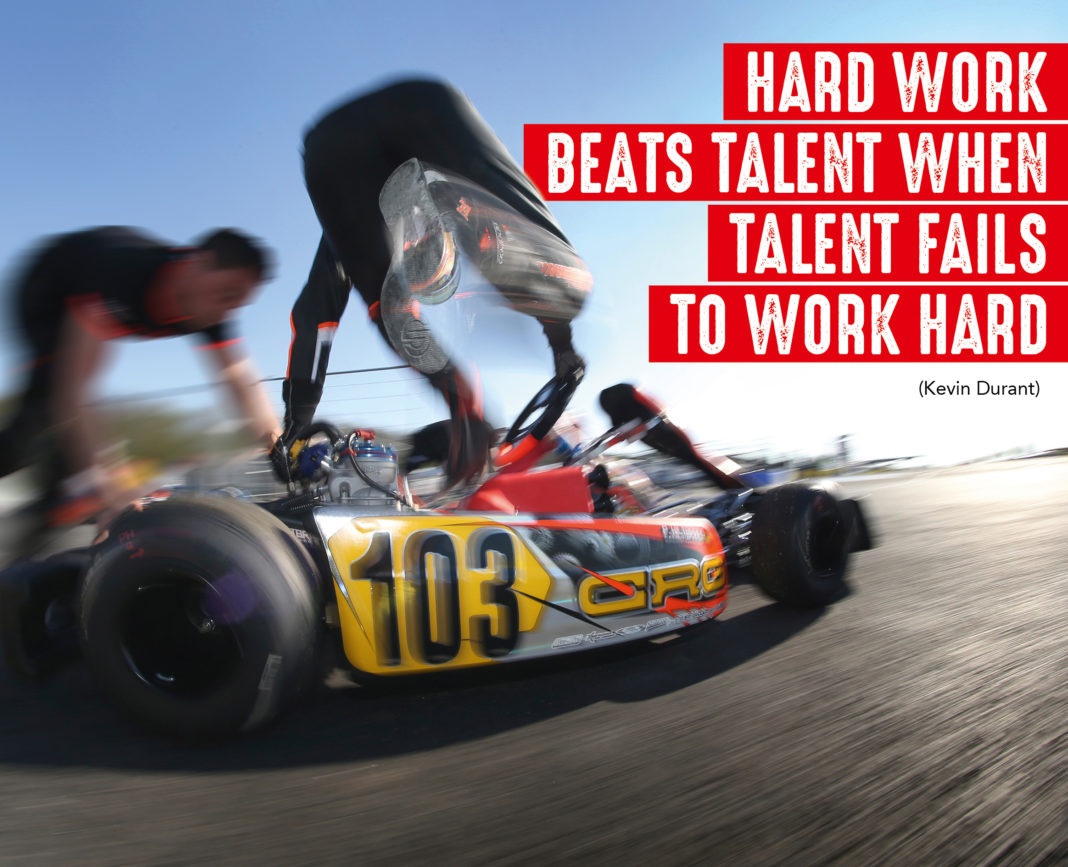Driving a kart at a good level requires two main things: talent and training. The first is something one is born with, you can either have it or not. It is an instinct, an inclination towards speed and sensibility, all factors that provide a driver with a good base. You cannot buy these, but they can be developed though. Regarding training, it all goes down to own determination to build experience and skills that can constantly improve performances. The history of motorsport is full of talented drivers, but some less gifted drivers managed also to shine and reach the top. Among the biggest of all times are the drivers that combined natural talent and hard work to improve. We talk about drivers of the likes of Ayrton Senna, Lewis Hamilton and Max Verstappen, these are rare exceptions but provide great models to aspire to. This short guide aims to highlight 5 crucial points to improve the performance on track through work, training and dedication.
- How to train on track. Focus on driving and not on setup when you work to improve your performance. Train with a standard setup and look for the limit without worrying about a little over or understeering: brake a bit earlier or wait a bit longer before stepping on the gas in these cases. Look for your best before looking for that of the chassis. Do not be afraid to make mistakes while looking for the limit: remember that most probably if you do not make mistakes you are not fast enough. Before questioning the chassis, engine and mechanics question yourself. Do not hide behind alibis and you will improve faster.
- Train on the rain. One of the wrongest things is not to train when it is raining. First of all, a lot of races take place in the rain and not being trained or capable of making a good setup is quite silly. Moreover, a wet track is a great school: it teaches you to improve your driving sensibility, to change the racing lines depending on the grip that changes quickly as the track dries or gets wet. This experience is very important for every driver, also when racing on the dry.
- Learn from the strongest drivers. It does not matter if you are a professional or an amateur driver, on track you will always find someone that makes the difference in your category or in the track where you often run. An important comparison is also under the same tent: your teammate. Learn from them copying their lines and watch them from the outside. Try to understand their braking and acceleration points and how they use the steering wheel: the strongest drivers do not use it that much. A direct comparison with the strongest and more experienced drivers is the best way to improve your performance in motorsport. This is also true when in your team you have experienced former- drivers: listen to them and practice all that you can learn from them.
- Acquire the technical aspects. A lot of drivers believe that their job is just driving and do not care about pressures, camber, caster and type of axle. Remember that knowing the technical aspects and how to set up a kart is a great advantage and can make the difference in your karting career as well as in motorsport if you will have the luck to pursue your career in motorsport. This can allow you to provide precise information to your mechanic, understand quicker than rivals if a regulation works or not and to take the right path earlier. Remember that everything happens very fast at the wheel of a kart and understanding the behaviour of the chassis requires great focus as making mistakes is easy also for professional drivers. It is useful to learn to read telemetry tracks and compare your driving sensations with the data and the feedback from outside from your engineers.
- Train the body and the mind. A driver is an athlete and as such he/she must be trained. Regarding your body, you must be able to sustain hard driving stints without too much strain, therefore running and following a correct diet is very important. Karting races are often decided in the closing laps and a better-trained driver will definitely be fresher. Karting does not require an important muscular mass, but arms and neck are under quite a lot of stress. Alongside your body, mind plays a crucial role: in modern sport mental strength is virtually always more important than body fitness. The work of mental coaches on athletes improves their self-confidence and the confidence on their performance, the attitude to manage mistakes in a positive way, the capability of channeling rage effectively and to manage anxiety and stress that can become a limit. A good mental approach to racing improves self confidence and awareness of own strengths, which is very important for all successful drivers and athletes.






